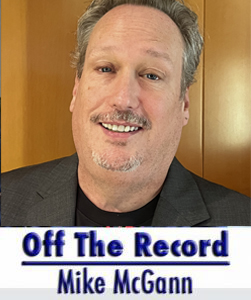By Mike McGann, Editor, The Times @mikemcgannpa
 You’re probably hearing a lot about “DEI” again these days — fueled in part in attempt to some discredit Vice President Kamala Harris’ run for President.
You’re probably hearing a lot about “DEI” again these days — fueled in part in attempt to some discredit Vice President Kamala Harris’ run for President.
You’ll be shocked to know I have thoughts.
Diversity, Equity and Inclusion. That’s what DEI stands for. What some of the people using it as a scare tactic are really saying is “White, Christian men should rule.”
So, to be clear, if you rant about DEI, you’re literally saying you’re against Diversity, Equity and Inclusion, that America should be left to the power of white men. As a white guy, I find it offensive, of course, but it is stupid and shortsighted, as well.
Like it or not (and clearly some people do not), America is — and has always been — a melting pot of diverse cultures, races and religion and was founded as such. The first settlers came here to escape persecution in countries where there was an official government-backed religion that differed from their own. Additionally, our own founding fathers saw the impact of religion-based conflict in Europe and elsewhere and decided this should not happen here.
As white men become a minority, they seem to be panicking about losing their status of being king of the hill. Good. White men are in no way superior, morally, spiritually or intellectually to everyone else. They are, to put it indelicately, just as full of crap as everyone else, no better, no worse, but have enjoyed more than two centuries of Affirmative Action to keep them in control.
And that has been a cancer on our nation. From slavery to denying women the vote (or much of any rights), we needed to evolve to being a better, fairer country. As immigration and diversity in the US has grown, we’ve gotten better and stronger as a nation.
Equity says what it means: fairness. Everybody gets an equal shot — which has long not been the case in this country. If you’re against fairness, it says more about you than our country.
Inclusion means we integrate everyone possible into our society. It means acceptance. I may not like your lifestyle or views, but it is not my place to pass judgement on it or exclude you from being a full participant in society. That also means I get to participate in society if someone else disapproves of of my beliefs or lifestyle.
So people who rail against DEI want our country to return to a time when there was less fairness, less opportunity and tolerance in our country.
And by the way, the prime beneficiary of DEI policy? White women.
I’m old enough to remember when women couldn’t have their own bank accounts or credit cards. And even today, my 23-year-old daughter doesn’t have the same legal rights as her twin brother: on average women still get paid less for the same work as men, are discriminated over health and maternity issues and, sadly, do not have equal rights under the law. The failure in the 1970s of the Equal Rights Amendment remains an embarrassing stain on our country.
DEI, while certainly helpful to ethnic and religious minorities, is about giving everyone the same rights and opportunity under the law and in society. If you oppose that, you have to ask, why?
Are you afraid of losing the unfair advantages white guys have had for centuries — screaming mediocrities climbing the corporate or political ladder because they had the right color skin and gender, while more capable options of other races and genders are left by the wayside?
Good.
If you’re not able to compete on an equal basis, too bad. Greatness comes from competition — hiring or electing the best and the most capable.
If you can’t handle that, then you’re supporting another D, discrimination. And there is no room in 21st Century America for that.
We are better than that. And I think we’re about to see a shocking number of voices come out to agree.








I, for one, agree with your commentary.